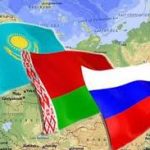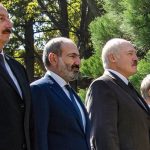- 14 November, 2023
- Eurasian Economic Union

On October 24, 2023, the Russian press reported that the State Duma has abandoned the bill to recognize Armenian driver’s licenses. Chairperson of the State Duma Vyacheslav Volodin explained this by the circumstance that Russia recognizes the driver’s licenses of citizens of Belarus, Kazakhstan and Kyrgyzstan, where the status of the Russian language is fixed by the Constitution, and Armenia has not taken steps in this direction.
At the beginning of the plenary session, Yevgeny Moskvichev, the chairman of the Transport and Infrastructure Development Committee, came up with a proposal to suspend the discussion of the bill. In his opinion, the initiative currently is not in line with Russia’s interests.
Thus, by the vote of the MPs of the State Duma, the discussion of the bill on recognizing national driving licenses as long as citizens of the Republic of Armenia are engaged in the business or employment sector was postponed for an indefinite period of time (the bill passed the first reading in June 2022).
It has been quite a long time since thousands of Armenian citizens with an Armenian driver’s license have been facing legal issues while carrying out business activities in Russia (for example, driving a taxi or a truck).
The non-recognition of Armenian driver’s licenses in the Russian Federation contradicts the Treaty on the Eurasian Economic Union, which guarantees the free movement of goods, services, capital and labor in the territory of the Eurasian Economic Union.
In particular, Article 1(1) of the mentioned document states:
“Under the present Treaty Parties shall establish the Eurasian Economic Union (hereinafter the Union, the EAEU) and ensure free movement of goods, services, capital and labor as well as coordinated, agreed or common policy in the economic sectors defined in the present Treaty and in the international agreements within the EAEU.”
According to Article 4 of the same agreement, one of the main objectives of the EAEU shall include:
“the desire to create a common market for goods, services, capital and labor within the EAEU․”
And according to Clauses 1 and 2 of Article 28:
“The EAEU shall take measures to ensure the functioning of the internal market in accordance with the provisions of this Treaty.”
“Internal market covers economic space in which under the provisions of this Treaty shall be provided a free movement of goods, persons, services and capital.”
The EAEU agreement also stipulates that the existing restrictions cannot be tightened and should be loosened step by step. The following is defined by parts 1 and 2 of Article 66 of the Treaty:
“Member States shall not introduce new discriminatory measures in respect of trade in services, establishment, and activities of persons of the other member State as compared to the treatment in force at the date of entry into force of this Treaty.”
“To ensure free trade in services, establishment, activities and investments, the member States carry out gradual liberalization of conditions for mutual trade in services, establishment, activities and investments.”
Moreover, according to Clause 2 of Article 67:
- Within the process of liberalization of trade in services, establishment, activities and investments the member States are guided by the following principles:
1) optimization of domestic regulation – gradual simplification and (or) elimination of excessive domestic regulation, including approval requirements and procedures for service suppliers, service consumers, persons carrying out establishment or activities as and investors with consideration of the best international practice of regulating the specific services sectors, and in case of lack of such a practice – by selecting and applying the most advanced models used by the member States.
The Treaty on the Eurasian Economic Union also stipulates that the states should strive for the creation of a common transport area. Thus, according to Article 86 of the EAEU Treaty:
- The EAEU carries out coordinated (correlated) transport policy aimed at ensuring economic integration, consistent and gradual creation of a single transport space on the principles of competition, openness, security, reliability, availability and environmental compatibility.
According to Part 2 of the same article:
Objectives of coordinated (correlated) transport policy are: creation of a common market for transport services; integration of the transport systems of the member States into the global transport system and efficient use of transit potential of the member States.
According to Chapter 1(2) of Protocol 24:
Single Transport Area – is a complex of transport systems of member States within which is provided unrestricted movement of passengers, movement of goods and vehicles, their technical and technological compatibility on the basis of harmonized legislation of member States in the field of transport.
Article 87(2) stipulates that:
The member States shall seek a gradual liberalization of transport services between the member States.
The above-mentioned provisions prove that a number of principles and objectives agreed and declared within the framework of the EAEU simply remained on paper, at the level of good wishes. At least with respect to the Republic of Armenia, the formation of a single market for specific services and labor within the framework of the EAEU was not ensured. Moreover, additional obstacles were created in this regard. Instead of the phased simplification and/or elimination of excessive domestic regulation and liberalization, the opposite happened: problems were created with regard to the creation of a common market for transport services (formation of a single transport area).
- As regards Armenia, the liberalization of transport services has simply remained on the level of declarations, with no relation to the reality on the ground. Migrant workers who moved from Armenia to Russia (for example, taxi or delivery service drivers) and their families were especially affected by this situation and are forced to invest additional funds and efforts to obtain driver’s licenses that are considered acceptable in the Russian Federation.
Ruzanna Avagimyan
Union of Informed Citizens




